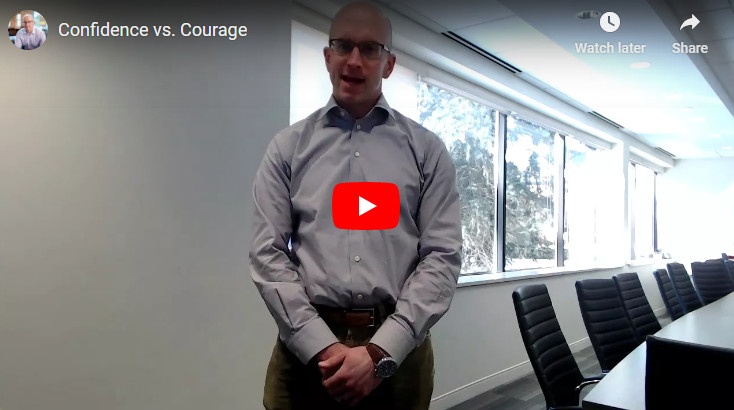The Arc
I have been captivated by Ron Chernow’s extensive biography of Ulysses S. Grant. Grant’s rise from irrelevance to the White House was sudden, and rather remarkable in hindsight. Post Presidency, Grant became the first 19th-century American President to tour the world for over two years. After a brief political comeback went up in flames, he devoted his time to Grant & Ward, a brokerage firm he opened with Ferdinand Ward and his son, Buck. As Chernow details in the biography, however, Ward was the 19th-century version of Bernie Madoff using the business as a Ponzi scheme. When the scheme was revealed in 1884, instead of being worth over a million dollars as he thought, President Grant was in actuality only worth about $84.
He had come full circle.
While there is much to learn from Grant’s story —especially around blindly trusting others, something he struggled with throughout the course of his political leadership—the point here is around the arc.
Most leaders, myself included, surmise that their arc will always be up and to the right. This isn’t to say that we are “cocky,” for we realize that some periods might be stagnant, or even have momentary downturns. But overall, we expect the path to be up and to the right: You get promoted, you work hard, you get promoted again, and the cycle goes on until you “retire.”
But this isn’t always the case. In fact, the norm for athletes is to “peak” at some point along their journey, and then come back down. “Father Time” always wins, as they saying goes. So why should we, in business, think we are any different?
Being cognizant of this potential reality, the challenge for us leaders is to remain:
1. Humble. Shouldn’t we be gracious to those who are helping us on the way up the arc? We might need their help on the way back down —President Grant received a $1,000 interest-free loan from one of his soldiers after the Ponzi Scheme was unveiled. Had Grant treated this soldier badly during the war, one can assume such help would not have been available to him when he needed it most
2. Hungry. As any golfer knows, every round is new. In other words, you cannot rest on your laurels. In business, we need to be careful not to fall prey to our hunger waning over time. Are we still willing to do what’s uncomfortable, or change? If not, isn’t it only a matter of time until we start to fade?
2. Smart. We need help. If we foolishly think we can make it on our “own,” we are headed to the other side of the arc because our own efforts are not sustainable.
(“Humble, Hungry, and Smart” comes from Patrick Lencioni’s Ideal Team Player, which continues to be the best book I have read on the subject).
For here lies the other reminder from the Grant biography: all figures of importance made it to the top of their arc with the help of others. In short, they were surrounded by a “team.”
If you and I are to make it there — the top of the arc —it will only be because we have surrounded our self with an extraordinary team.
Let’s always remember that.
On the Necessity of Listening to Those You Don’t Agree With…
The other night I decided to do something that was uncomfortable by listening to a political figure I disagree with on mostly everything. This person’s identity is irrelevant; what is relevant is whether or not we – leaders – are willing to listen to those we disagree with?
In business, livelihoods depend on people of diverse backgrounds and beliefs being able to work together. For 99% of us, there is no “bail out” to fall back on if we can’t get along with those with whom we disagree. While the government can hit a stalemate and just shut down, businesses can’t do that without turning the lights off and sending people home. Out of self-preservation we have to find a way to work with other people, regardless of our differences.
Of course we can still blow it. I’m sure I am not the only one who can think of a project that never saw the light because of two warring factions in the supply chain. It was childish, and everyone lost because of it. But thankfully, this is not the norm.
The norm, at least from my vantage point, is diverse people coming together to make things happen. This always begins with listening and understanding the views of others.
Are we open to listening to the other? What about changing our minds on a topic? Back to the political example above again: Considering that I genuinely want the best for our country, I routinely ask myself the following questions:
1. Am I rooting for or against this person, even at the expense of the country?
2. Do I wish this person well? Really?
3. Am I open to the possibility that my view is wrong, and their view is right?
Answered honestly, these questions help me maintain perspective when listening to someone with different views. They’re also a litmus test for where my heart is. For if I am truly seeking the ill-will of others, I not only have a problem much larger than can be addressed here, but I also am not going to listen to them at all!
To be sure, this is often very uncomfortable.
But, the goal is not comfort…
Or to be right.
The goal is to get things done.
To keep the lights on.
Are you willing to get a little uncomfortable in order to make it happen?
On the Necessity of Listening to Those You Don’t Agree With… Read More »
Will you help me?
A few weeks ago, I felt completely over-committed. Between an International trip, a minor speaking engagement, business booming, and family life, I did not have margin for much else. And yet, I had to prepare for one of the bigger speaking engagements of my life at the end of the month.
Reviewing my outline, I came to one conclusion. What I had created absolutely sucked.
So, I did what any wise husband would do. “Will you help me?” I asked Sarah.
Thank God for Sarah.
She refined it.
She cut out the fluff.
She got rid of the extraneous nonsense.
Especially the parts where I was making myself look better than I was.
When I looked at the new outline, I had hope about the future product.
A few thoughts on asking for help:
Ask early. I asked for Sarah’s help more than 3 weeks prior to giving the talk. I still had time to make wholesale changes, which I did. Conversely, if you ask for help too late in the game you don’t have a chance. Whatever you are creating will suffer because doubt will enter the equation.
As I learned in competitive golf, if you are messing with your swing on the driving range, you have no chance of winning the golf tournament. Same here.Ask someone you trust. This will sound pompous, but I could care less what most people think about certain topics. When it comes to my speaking, I trust my wife over any other human being. She knows me best. There are also other friends whom I would trust. In fact, I ran an outline of a potential talk to a friend (also a customer) last month, and they gave me incredible feedback that will shape what I do with that talk on sustainability. That kind of feedback is golden. Just be careful who you ask. Most engineers would not ask me how accurate their CAD model is, and for good reason—I cannot be trusted to give an accurate answer because I lack that ability! So choose wisely.Ask with genuine humility. At first glance, this should be a given. But notice that in my example, I did not ask Sarah to do anything specific. Rather, I asked for “help,” which gave her full authority to “help” in anyway she saw fit.
She had the freedom to rip it up, suggest I start anew, or even disagree with my diagnosis altogether. The point here is that I did not steer her towards my bias (i.e. that the outline was terrible) and gave her the freedom to help as she saw fit. It takes real humility to allow this to happen.
I challenge you to ask for help the next time you are stuck. Ask early, ask someone you trust, and ask with genuine humility.
Your work will get better in the process.
Observations from Korea
I write these words on the last leg of my journey home from Korea. I normally don’t use the blog to comment on business trips, but given the hoopla regarding the political climate in Korea, I feel this trip to be different.
Fear
Many people were surprised that I was going to Korea. “Are you sure it is safe?” they asked. Ironically, many Koreans do not think it is safe for their loved ones to travel to the United States, especially Chicago. One customer confided that his family is convinced he is going to get shot when traveling to America. (Sadly, by the time I landed back in the states, this reality rang true again).
It seems that people from both countries rely too heavily on messages about the “other” that are given to them, as opposed to going and seeing for themselves.
Seeking Understanding
One customer began rambling about all the things they did not like with regards to the United States, especially its politics. Less than twenty four hours later, a different customer went on a rant about how much they liked the United States and its current stance with North Korea.
I listened to both, seeking to understand their points of view, instead of sharing my opinions.
I was reminded that I need to do the same back home. Whether in Korea, or in Chicago, we are still more alike than we are different. If we stopped shouting, started listening —and forgive me, turned off all cable news programs designed to confirm our personal biases —I suspect many Americans would remember this and we wouldn’t be as divided as we currently are.
Flexible Packaging
Like many who read this blog, I am crazy about flexible packaging, spouted pouches in particular! As all of us in the industry know, the flexible packaging market is global. Korea, Europe, Latin America, the United States, and everywhere! The market rewards innovation and effort, thus providing an equal playing field for us all. And the best part is that its progress is tied directly to people from different parts of the world creating enduring relationships.
I absolutely love this!
A final, personal, note.
In the short time I was there, I fell in love with the Korean people. In fact, I have a lot to learn from their hospitality, and graciousness. Given this, I leave even more passionate regarding the conflict between North Korea and the rest of the world. What’s apparent, at least to me through various news organizations, NGOs, and ministries like Voice of the Martyrs, is that the human rights violations in North Korea are real. Moreso, it was apparent in conversations with people in Korea, that the tension existing between the two countries is ever-present. Therefore, I leave more motivated to give, more motivated to pray, and more motivated to use whatever influence I have to spur others to do the same.
While I understand some readers of this blog may not share my personal faith —and all are welcome here—I hope we can all agree that the human rights violations happening in North Korea need to end immediately.
As I have said before, every human being matters.
(Back to my normal blog Monday!)
Observations from Korea Read More »
Creating a Wide Enough Net
I received another rejection notice the other day for a potential speaking engagement.
I was somewhat relieved.
A few observations…
First, I was relieved because I have thrown my name in the hat for several speaking engagements. So a few “you have not been chosen” messages are actually relieving.
Second, I take rejection as a sign that I am casting a wide enough net. I am admittedly reaching, instead of “playing it safe.” Nothing ventured, nothing gained.
Finally, my speaking proposals are unconventional, which leads to potentially more rejection. Instead of a standard “commercial,” my proposals make an argument. The topics may range from sustainability, blame, to a variety of leadership issues, but the the emphasis is always on moving the audience to some sort of action. Admittedly, not everyone likes this kind of approach. But, my goal is not to be something for “everybody” anyway.
I share this to encourage you to keep casting a wider net. More than that, do it the way you feel it should be done, rather than becoming the cookie cutter: Design the new part. Implement the new system. Promote the promising millennial.
Doing the unconventional will always be criticized, and may lead to the kind of rejection that I have shared in my personal speaking journey. The part might not work, the system might wreak havoc, and the millennial might leave (at least that’s what I am told they typically do —and I don’t believe it!)
Keep striving anyway.
Keep working to get better.
I’ll do the same with public speaking. In fact, this year I am going to get some help with my speaking, which is a topic —help—that I’ll turn to in my next post.
Creating a Wide Enough Net Read More »
Who is the hero?
Many sales people “show up and throw up.” In attempting to overcome every anticipated objection, they describe all the features and benefits of their service or company. “Our quality is impeccable, our on-time delivery is 99.9%, our pricing is competitive, and our customer service is second to none.”
Have you ever heard a pitch where someone admitted that their customer service was mediocre? Just imagine, “our quality is great, but our customer service is mediocre. I mean, we get back to you eventually, just not right away.” (It might be refreshing to hear this from someone at the cable company!)
I get why sales people do this. For starters, they have been trained to. Sure, most training programs talk about asking questions and uncovering motives. Some do a particularly great job in that pursuit. But most mainline sales training programs focus on the finer points of self promotion. It is also natural to talk about yourself when nerves set in—it is a self-preservation strategy, and at its core, a necessary one! For if you can’t “sing for your supper,” you will go hungry.
But as I have written about before, I believe there is a better way. Instead of talking about how great you are, you could talk to the customer about how great their business or idea is. You are not the hero, and in the B2B world, neither is your customer. The real hero is further down the line. It is the mother trying to grocery shop while simultaneously trying to manage her three rambunctious kids. It is the retired school teacher mowing his neighbor’s yard. It is the mom and dad nervously handing over the keys of the new car to their 26-year-old son (note: the age is not a typo, just an extreme anchor in case my kids read this in future years!).
The point is the hero is OUT THERE, outside your walls. Of course there are heroes inside our walls, and we can’t serve the ones out there without a cared-for team inside, but the focus begins out there.
What are the hero’s needs?
What does the hero define as impeccable quality? To spec, or something else?
When does the hero need what we produce? Do we measure to that, or to our internally-quoted lead time?
What does the hero need in terms of customer service?
Whose expectations are we living up to, ours or theirs?
It is not about us. It is about serving them. The real heroes.
Are we creating fans? (“Wow, it sounds like you guys are an amazing company!!”)
Or, are we creating customers? (“Wow, it sounds like you guys care about us!”)
Choose wisely.
Did WE get a bonus?
“Did WE get a bonus,” asked Sarah as I walked into the door. It was the end of the year, the company had done well, and so her anticipation was appropriate.
“Yes, WE did,” I replied.
All of us play a “we” game.
Take me for example.
Without Sarah, I wouldn’t travel nearly as much. Without Sarah, I wouldn’t have the flexibility to stay late, or walk the floor on Saturday mornings. Without Sarah, I’d come to work needing affirmation, instead of finding it at home. Without Sarah, my blog would be much worse (and that may not have anything to do with work or the bonus, but it would surely impact you, the reader!).
The company wins because of the sacrifices Sarah makes.
Yes, WE got a bonus.
You have a support team behind you as well: family and friends who fortify you physically and emotionally in order to allow you to show up every day and give your all.
And your team members at work have a support system of people, too—people you may never meet—who indirectly benefit your company even though their names aren’t on the payroll.
Everyone brings their life with them to work.
As leaders we need to not only remember this, we have to remember to reward the sacrifices THEY make, too. Granted, a bonus is one way. But it surely is not the only way.
Let’s remember, and honor, the people behind the people we count on each day.
It is a “we” game.
Did WE get a bonus? Read More »
Confidence vs. Courage
What’s the difference between confidence and courage?
Are you willing to do what is uncomfortable?
Confidence vs. Courage Read More »
On Mentoring
A few weeks ago, a family friend asked me if I could mentor their child. Of course!
Anyone who knows me knows that I believe in being 100% transparent. So, I share the email I wrote to this individual below in hopes of modeling one way of doing so —“one way” is the key phrase here because your way will probably differ from my way.
I also share because most of the readers of this blog are leaders. Therefore, I pose the question to you: In your life, who could use an email like this? Who could you be mentoring?
I hope my email gets you thinking about someone you could challenge (and hopefully build up). In case you’re wondering, this person told me that they thought the email was “intense,” but they liked the intensity because it forced them to think about the questions I outlined. I also think it is safe to say that we both learned a few things from the time we spent together, which is another positive aspect of “mentoring.”
Here is the email I sent to setup our meeting:
Dear X,
Things to consider before meeting:
1. How can I serve you? (That question probably sounds creepy…but what questions do you have that you are embarrassed about? Maybe you don’t have any. But I used to think being a “grown-up” meant that you had your stuff together, so I did not ask a lot of questions because I was afraid to look stupid. This is not the case at all. Most people stay this way because they don’t ask).
2. What do you want to do? Really? (Keep asking yourself this over and over, emphasizing the “really” part.) I wasted (say “used” in front of my father please) a lot of his money to get a teaching degree. I don’t think I ever really wanted to be a teacher however (but I didn’t realize this until I was in my 30s).
3. Do you want to meet or are you doing this because your mom wants you to? Be honest. I can do the check the box thing. I love your grandfather and would do just about anything for him. I just want clarity here. The “check the box” meeting is 15 minutes. I am offering much more than that.
What I am bringing:
1. Vulnerability. I won’t hold back.
2. Transparency. Again, I am an open book.
3. Time. I’ve got plenty of things to do. This kind of meeting excites me. I am choosing to do this.
I write a lot about leadership here: http://baldinbusiness.com/ . Read a few posts if you want to get to know me better.
If I received an email like this when I was your age, I’d think the dude was nuts. I am sure my wife thinks I am. But we have a happy marriage because I am completely transparent about everything.
I approach life that way.
You won’t get anything less from me,
Alex










